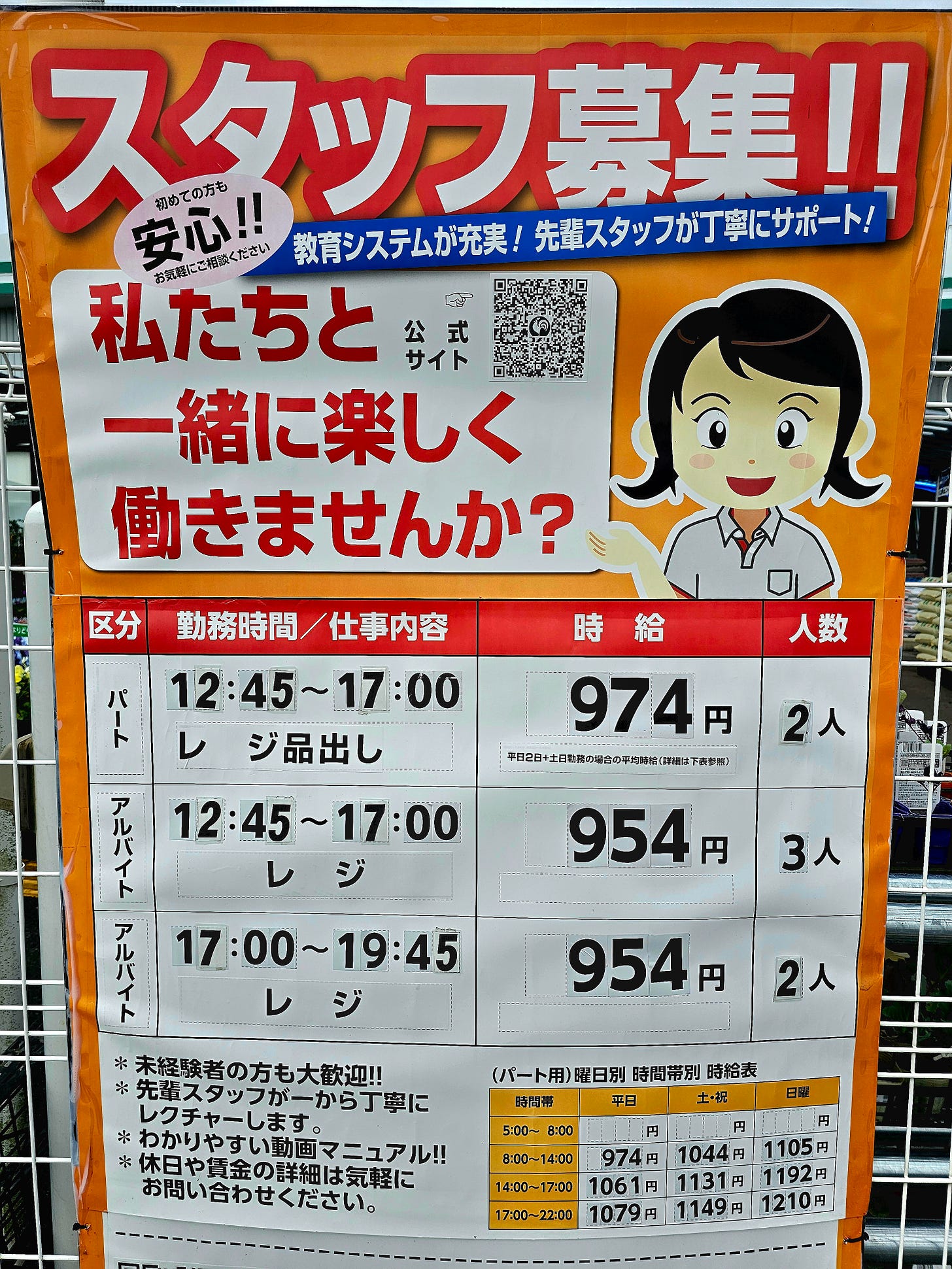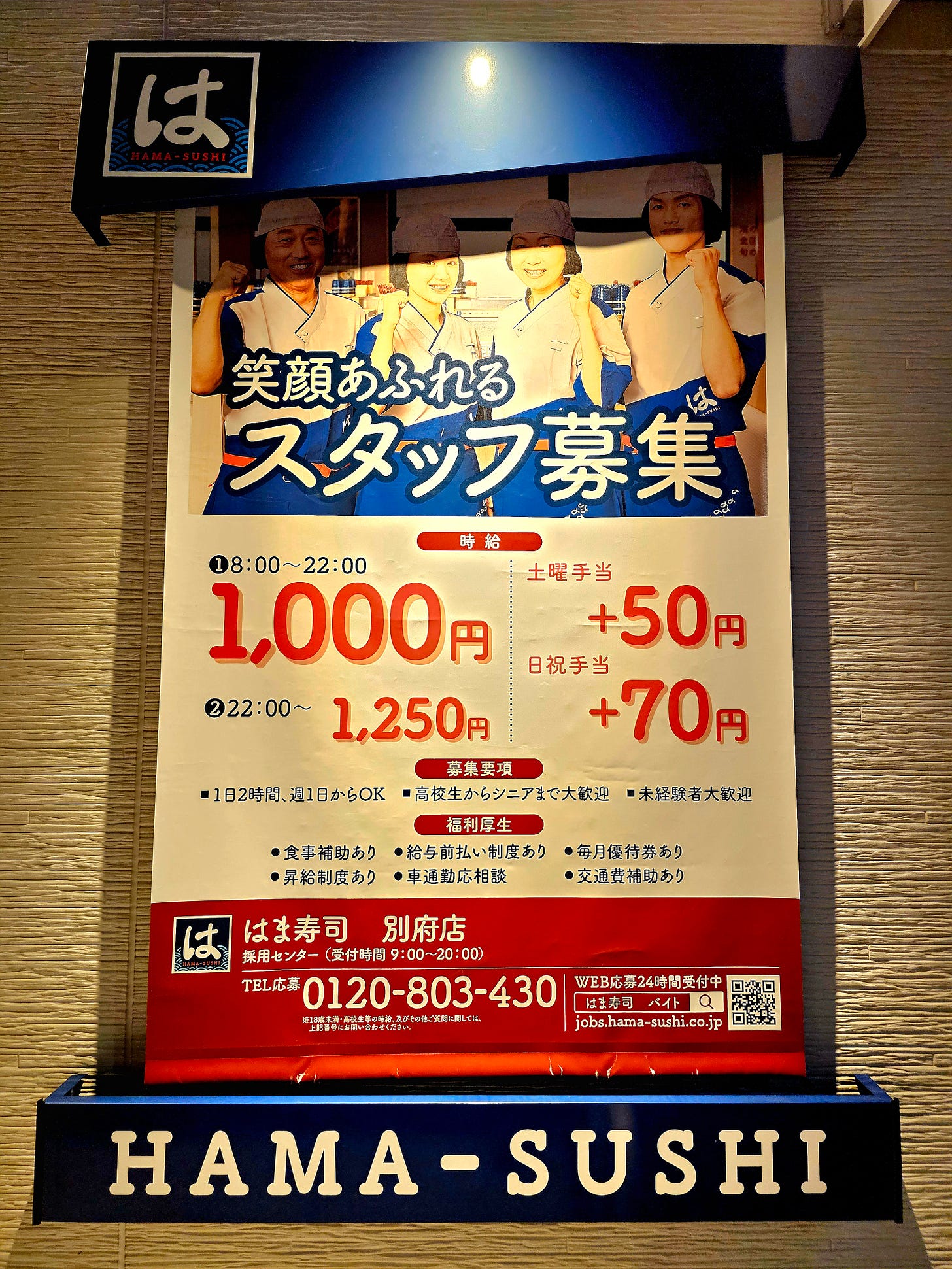

Discover more from Real Gaijin
Japan's Politicians Stick to BHAG of 1,500 Yen Minimum Wage
Will Japan's new Prime Minister Shigeru Ishiba be able to use the LDP's playbook of advocating a higher minimum wage to raise it by more than 40% by 2029?
Amid ongoing debates in Japan's Diet on how to improve the income of ordinary citizens, calls to raise the minimum wage to 1,500 yen (approximately $9.71) per hour are growing louder. This goal was originally set by former Prime Minister Kishida of the Liberal Democratic Party (LDP) as a target for the minimum wage amount on a nationwide average by the mid-2030s. Subsequently, current Prime Minister Ishiba made a comment prior to the LDP presidential election that he would "aim to raise the target to 1,500 yen on a nationwide average by 2029," and this figure once again attracted attention.
Catch up quick: We've heard this story before, and it's actually a tried-and-true rallying cry from Japan's still-dominant (if fading) Liberal Democratic Party, or "LDP" for short. Japan-based economist Richard Katz has summarized in "Japan's Minimum Wage Miracle" how past leaders have helped achieve the relatively recent milestone of a minimum wage of 1,000 yen ($6.74).

By the numbers: Currently, Japan's minimum wage is 1,055 yen ($6.83) per hour on average, although it varies by prefecture (like a state). It is highest in Kanagawa at 1,162 yen ($7.52) per hour, which is one yen higher than the average in neighboring Tokyo. The minimum wage is lowest in Akita Prefecture, one of the country's poorest and most depopulated regions, at just 951 yen ($6.16). Thus, the delta between the highest and lowest levels in the country is 211 yen ($1.37).
To reach the Prime Minister's goal, the average gap must be closed by 445 yen ($2.88). This is an increase of 42.2%, which seems far from certain at this point.
To get a sense of whether this goal is within reach, consider that it took ten years for the minimum wage to increase by 275 yen ($1.78) since 2014 (in terms of percentage increase, +27.4% in Tokyo and +30.7% in the national weighted average). Therefore, the prime minister's stated goal seems more like a big hairy audacious goal (BHAG) than something based on reality.
Nevertheless, the minimum wage in Tokyo rose by a record 50 yen ($0.32) last year. In fact, Japan's minimum hourly wage has been rising steadily in recent years. Minimum wages in the Tokyo metropolitan area (including top-ranked Kanagawa) tend to be the highest in Japan, reflecting the fact that living costs such as rent and food are higher than in other regions.
Why it matters: As Richard Katz points out in the above article,
" It has taken a couple decades, but Tokyo has finally raised the minimum wage enough to lift almost 20 million workers above levels close to, or even below, the poverty level." - Richard Katz
Increasing the minimum wage is important for many reasons:
Increased consumer spending: When low-wage workers earn more, they have more disposable income to spend on goods and services. This increased spending power can stimulate the economy and create demand for businesses, potentially leading to job growth.
Reduces poverty and inequality: A higher minimum wage can help lift low-wage workers out of poverty and reduce income inequality. This can lead to a fairer society and improve overall well-being.
Improved worker morale and productivity: Studies have shown that workers who are paid a fair wage tend to be more motivated, have higher morale, and are more productive. This can benefit businesses and consumers alike.
Reduced dependence on public assistance: When low-wage workers earn more, they may rely less on government assistance programs such as food stamps and welfare. This can save taxpayers money and reduce the strain on social safety nets.
Potential for higher quality goods and services: In some cases, businesses may choose to invest in higher quality products or services to justify the increased labor costs associated with a higher minimum wage. This could benefit consumers by providing them with better options.

Yes, but: There are plenty of skeptics.
"It's a level that would bring the company to its knees... It's impossible to raise it suddenly because (raising it to 1,500 yen) would force me to raise prices and lose customers... Many small businesses would go bankrupt." - A 41-year-old man who runs a mail-order business in Aichi Prefecture that employs many part-time workers earning 1,100 yen ($7.14) an hour
The ongoing devaluation of the Japanese yen against the U.S. dollar is also putting pressure on Japan's network of small and medium-sized businesses, which employ about 70 percent of the country's workforce. The potential for U.S. tariffs only makes everyone more anxious.
"It's hard to raise labor costs when we can't even pass on the cost of raw materials." - Yoshiaki Ishikawa, president of Ishikawa Metal Industry, a foundry that makes parts for naval ships
The price of raw materials has more than doubled for copper and quadrupled for tin compared to 2020. Despite this challenging environment, Mr. Ishikawa's company has decided to raise wages for the past two years to protect the livelihood of its 50 employees, who are facing higher prices for everyday items. However, there is growing concern about the company's ability to sustain this practice.

Of note: In view of the significant impact on the economy, the government is providing support measures such as operational improvement subsidies to reduce the burden on enterprises that implement a minimum hourly wage increase (effective November 1, 2024). This subsidy is an important measure to ensure the smooth implementation of the minimum wage increase, as it provides a partial subsidy for the cost of capital investment, etc., by small and medium-sized enterprises to improve productivity and increase the lowest wage in their business by a certain amount or more.
There is also a program called the "Tax System to Promote Wage Increases for Small and Medium Enterprises," which allows small and medium-sized companies that file blue tax returns to deduct a certain percentage of the increased amount from their corporate tax (or income tax for sole proprietors) if they meet certain requirements and increase wages.

What’s next: The ruling LDP is currently joined by its main opposition, the Constitutional Democratic Party of Japan, in pledging to raise the minimum wage to "more than 1,500 yen" by gradually increasing it and passing the cost on to consumers. The Japanese Communist Party is pushing to eliminate regional disparities by switching from a system in which the minimum wage is set for each prefecture to a uniform national minimum wage.
Commentary: Especially to ensure that hard-working residents of Japan can earn a "living wage," I am fundamentally in favor of raising the minimum wage. Especially when converted into U.S. dollars, Japan's current minimum wage level seems extraordinarily low.
However, while the altruistic proposal to raise the minimum wage to 1,500 yen shows concern for the Japanese consumer, a reality check is needed. According to the ruling party's argument, to reach a minimum wage of 1,500 yen by 2029, it would need to increase by an average of 90 yen ($0.59) each year, or more than 7 percent.
"The average increase in the past has been in the 2% range, so how is that feasible?" - Ryomaru Kumagai, vice president of the Daiwa Institute of Research, a think tank
Rather than focusing too much on campaign promises that may be divorced from reality, I favor a more methodical, gradual increase. If it can be done sooner, great! If not, it is probably better not to risk breaking something else by rushing.
What do you think? Whether you live in Japan or not, if you have read this far, you may have something to say about this issue. All responses are completely anonymous, even to the author.
Links to Japanese Sources: https://www.mhlw.go.jp/content/11302000/001297510.pdf, https://kabu.com/kabuyomu/life/1074.html, https://news.yahoo.co.jp/articles/2b7812a6dcd0a60f5f21d93e90848c5ca9c8420f, and https://www.yomiuri.co.jp/election/shugiin/20241021-OYT1T50115/.
#最低時給1500円 #1500円問題 #賃金 #最低賃金 #MinimumWage
Please note that you can subscribe to Real Gaijin for free. If you are so inclined, you can also purchase an annual subscription for a relatively small fee.
However, I understand that even the lowest level of annual subscription allowed by Substack may seem too high for many. If you just want to buy a coffee for Real Gaijin (or maybe a green tea), you can also make a small donation here:
https://buymeacoffee.com/realgaijin
All levels of support - including just liking a particular article and/or leaving a comment - are very welcome. Thanks again for reading.
While Real Gaijin lives in Substack, you can also find Real Gaijin on a few other platforms (listed in alphabetical order).
https://bsky.app/profile/realgaijin.bsky.social
https://www.instagram.com/real_gaijin_on_substack/
https://www.threads.net/@real_gaijin_on_substack
https://www.tiktok.com/@real.gaijin
https://www.youtube.com/@RealGaijin
Subscribe to Real Gaijin
Unveiling the Real Japan: An American Expat's Inside Look | Hot takes, commentary, and unfiltered insights on life as a foreigner in Japan.

























I think mandatory minimum wage laws are bad.
They are also misleading. What is more relevant is what actual wages are employees getting. For example I think Shimane's minimum wage is under 1000 (962?) but when I see ads for arbeito jobs they are all at least 1000 and often 1100 for regular hours with later nights/weekends being higher still 1200+ and/or they offer benefits to go with the 1000/hr base like a free meal
Full time work appears to be higher (though I admit to not checking in detail, just looking at occasional ads I see)
By far the best thing the government could do is set the minimum tax threshold to 50 week of 40 hours at the current minimum wage (~2M Y)
I don't know where to get the statistics but my hunch is that almost all jobs pay more than minimum wage and that those rates are gradually going up thanks to the labor shortage. If the actual minimum wage goes up above 1500/hour it doesn't matter what the legal minimum wage does
Hopefully minimum wage doesn't increase like it has in the US, but it probably will. The higher the mandatory pays set by gov, the more society suffers and becomes too expensive. Taxes increase, goods increase, cost of living increases.